Sometime this month, possibly as early as Monday morning, the Supreme Court will issue its ruling in King v. Burwell. If the Court ignores both the text and purpose of the Affordable Care Act, and rules for the challengers, millions of the law’s beneficiaries in 34 states will quickly lose their insurance subsidies and be forced off their health plans. The ensuing chaos would be the consequence not just of the ruling itself, but also of the Republican Party’s expected unwillingness to pass a one-sentence bill clarifying that Obamacare subsidies are available in every state, whether or not each state established its own health insurance exchange.
When King, and similar cases, were first conceived, they quickly became vessels of hope for conservatives, who recognized how difficult and punishing it would be to hobble or eliminate Obamacare through the legislative process. What many of them have come to recognize in the subsequent years is that farming out the job to the judiciary can’t spare them from the subsequent political cost: As decision day approaches, more and more of these conservatives are acknowledging candidly—and typically anonymously—that they will suffer badly if the Supreme Court does the very thing they’ve asked the Supreme Court to do.
“The most likely option is that Congress is unable to pass a fix,” an anonymous Republican Hill staffer told Joel Gehrke of the conservative National Review—a magazine that has beseeched the Court to void the subsidies. “Either Republicans won’t be able to settle on a fix or the president will veto whatever we do come up with. At that point, it will be up to the governors to pass their own laws deeming the national exchange a state exchange. That is the path of least resistance.”
Gehrke looks at the cross-pressures Republicans would face after a ruling for King and wonders whether they “could be in for a bloodletting.” Though they can’t admit it publicly, the promise of a bloodletting—compounded by the fact that every vulnerable Republican senator in cycle next year represents an affected state—is precisely why so many Republicans privately hope the Court will uphold the subsidies.
If the conventional wisdom which took shape after oral arguments—and to which I subscribe—is correct, the government will win, and this painful exercise in bad faith legal mischief will come to nothing. But if the challengers win, and a bloodletting ensues, Democrats won’t be able to stand back while Republicans absorb the political damage. Bloodletting or no, Obamacare will be crippled in most states. It could easily remain crippled indefinitely. Its fate will turn on the question of whether the political consequences for Republicans resemble the consequences of a government shutdown or collision with the debt limit. But either way Democrats will have to play an active role in bringing about a resolution.
The best-case scenario for Democrats is a public outcry so severe and sustained that Republicans cave, and agree to restore the subsidies with a clean fix.
Republicans have tacitly acknowledged that they won’t be able to sit on their hands while state insurance markets collapse. They have introduced legislation in both the House and Senate that would restore subsidies, but only for existing beneficiaries, and only on conditions Democrats could never accept, like the repeal of the ACA’s individual mandate.
You can interpret these offers in two ways. The first, as Greg Sargent of The Washington Post has noted, is that these bills are designed to be vetoed, allowing Republicans to blame an uncompromising Obama for perpetuating the crisis. But they could also serve as bases for a compromise, or surrender. If the public responds to a ruling for King the way they’ve responded to other GOP-instigated crises, Republicans would have to scale back their demands and eventually agree to reinstate the subsidies, perhaps for a modest price.
Two different forces will push in that direction. Even if sprinkled liberally with poison pills, and even if its proximate purpose is to invite a veto, Republican-sponsored legislation to partially reinstate ACA subsidies probably can’t pass. Democrats aren’t going to vote for an ersatz fix and neither will many rank-and-file conservative members of Congress. “As soon as the messaging is out there saying, ‘Look, a half-a-sentence fix saves millions of people from either losing their coverage or having massive spikes,’ we as a party won’t be able to sustain that pressure very long — certainly not through the August recess,” another Republican aide tells Gehrke.
But that doesn’t mean Democrats will win a standoff outright. Though their case for a clean fix will be compelling, they will also be highly motivated to reinstate the subsidies immediately, even if it means Republicans get to pocket unreciprocated concessions. Those can’t include structural damage to the core of the law, but could include eliminating things like the medical device tax and the employer mandate.
Real danger arises if, per Gehrke's other source, an adverse King ruling registers somewhere below a government shutdown on the political Richter scale, inflicting damage on the GOP but not enough to make them seek a solution in earnest. Against the backdrop of a paralyzed Congress, Obamacare would begin to unravel in dozens of states, and would continue to do so until at least 2017. A ruling for the challengers would boomerang violently on Republicans, but Democrats have every reason in the world to want them spared from it.
